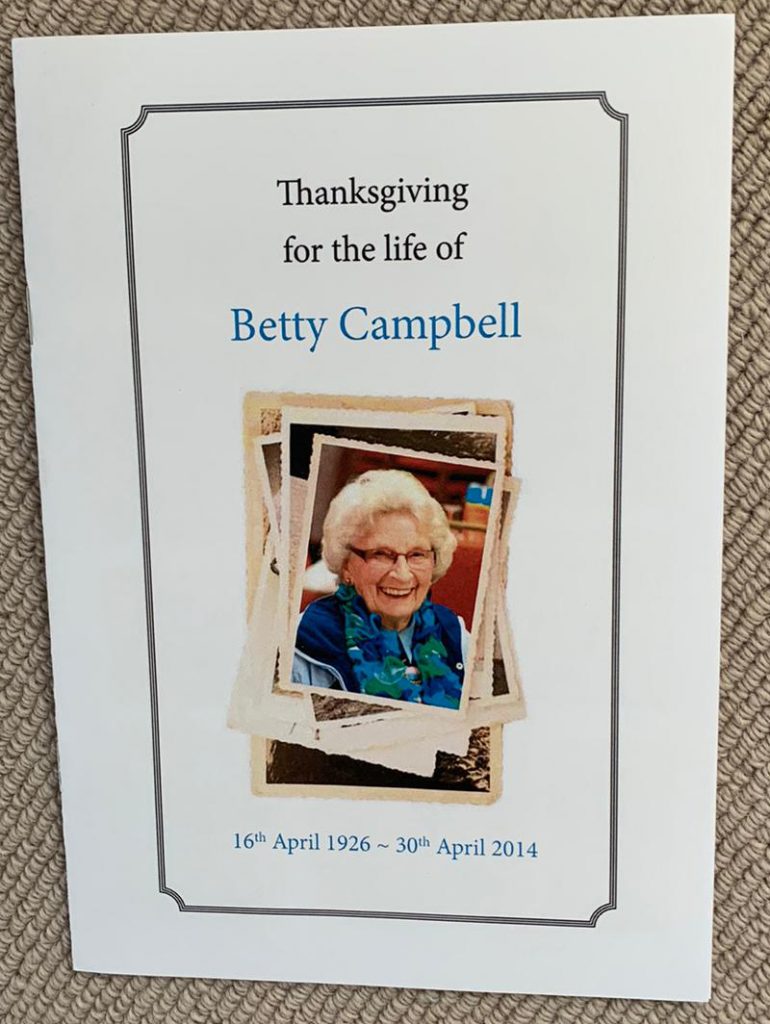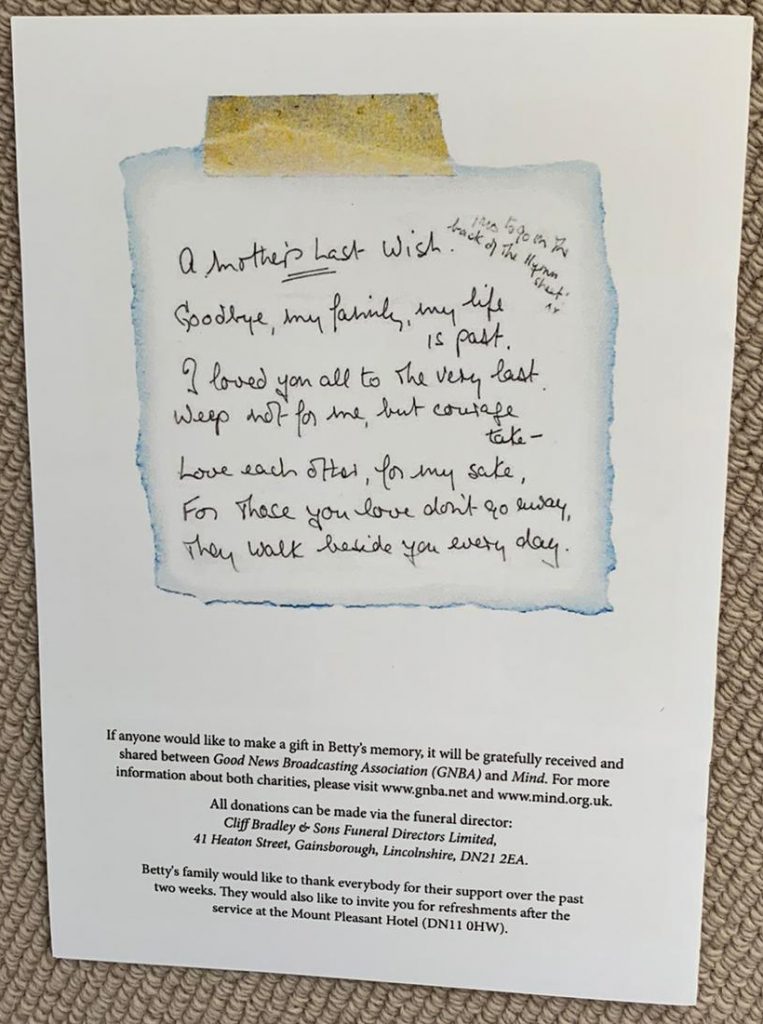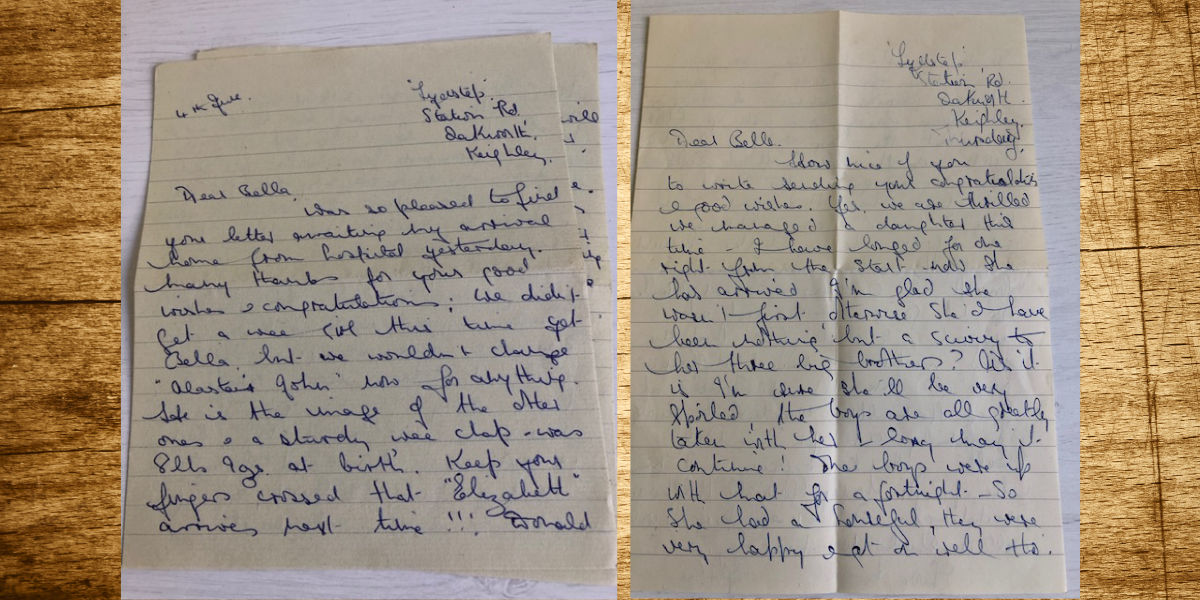A couple of weeks go, I wrote here setting out some tips for guarding against depression and anxiety. So far so good for me; indeed I am adapting to self-isolation perhaps too well! But I am aware many are struggling right now.
Three of my 20 tips were as follows …
Number 10 – write lots. ‘Think in Ink.’
Number 13 – Get in touch with someone you’ve lost contact with.
Number 14 – Do something good for someone else every day.
Well this morning, someone called John Watson combined to fulfil all of the above, with his own version of Number 13, by writing to me (point 10) in an act of kindness (point 14). He got in touch with me, via this website, though we have never met. The reason was that he wanted to put me in touch with someone I had lost contact with – my mother RIP – about an event of which I obviously have no memory, namely my birth, on May 25, 1957.
He wrote as follows … ‘Alastair, Hope you don’t mind me contacting you. I originally grew up in Kilmarnock (and am still an avid supporter of the football team, through thick and thin). My mother grew up on a farm on the Fenwick moor between Kilmarnock and Glasgow and it turns out that my gran, Isabella Young, was friendly with your mother. My gran died a few years back, but recently my mother has been going through her things to help with mapping out the family history and came across some letters from your mum to my gran, written just after the birth of you and your sister. I’ve attached photos of them below, and hopefully they might provide a welcome distraction in these dark times.’
You can see the front pages of the letters at the top of the blog, written from the place where I spent the first three years of my life, in Oakworth, Keighley, Yorkshire. It was so nice to be reminded of her handwriting, which never changed even when she was old. She never got doddery, and nor did her writing! She was, like many of her generation, a major letter writer. In the first letter of 1957 sent to me by Mr Watson, she seems happy enough with my arrival, though I have always known, as is clear from the second letter, that had I been born a girl, there would have been no third son in the family, no me. My sister Liz – she and I are the last surviving members of the family, our two older brothers sadly dying at 62 (my age as I write, as if there was not enough to be anxious about right now!) – will be delighted to have it confirmed that she was always ‘the one that I want!’ as John Travolta and Olivia Newton-John might put it.
Our Mum died six years ago this month, and I have been thinking about her a lot this week, not least because what would have been her first great-grandchild will shortly be born to my sister’s son, Graeme Naish, and his wife Leah; but also because of the prominent role the Queen has played in the current crisis, with her address to the nation on Sunday evening.
My Mum was born, at home, Burnhouses Farm, Moscow, Ayrshire, on April 16, 1926. She was named Elizabeth Howie Caldwell (she only had to change three letters of her surname when she married my Dad!) Five days later, to rather greater fanfare, another Elizabeth was born … yes that one.
So the Queen was a major figure in my mother’s life for the entirety of her eighty-eight years on earth. She was a huge admirer. As I recorded in a piece for the Daily Telegraph at the weekend, my first political row, aged six or seven, was when my mother said I had to sit with her and the rest of the family to watch the Queen’s traditional Christmas message. ‘Why?’ I protested. ‘Why should I care what some rich woman says, just because she lives in a big posh house, wears a crown and has a silly voice?’
That was more than half a century ago, and the beginnings of fairly persistent Republicanism. How I wish my mother was here to see me write this: that in common with millions around the world, I was keen to see and hear The Queen as soon as it was announced she would be broadcasting a special message to the nation about the coronavirus crisis.
I would go further … I think it is possible to make the case that The Queen is one of, if not the, most remarkable people on the planet. Below are just ten among many reasons.
Unique longevity. She has ‘done the same job’ for almost seventy years. We rightly admire people like Sir Alex Ferguson and Arsène Wenger for surviving more than two decades managing at a top football club, or Angela Merkel for leading a major democracy like Germany for fifteen years .. but seventy years; there is nobody else, in any other walk of life, who has done that.
Enduring excellence. She has been there since Churchill and while politicians come and go, sometimes hugely popular, sometimes less so, because of the way she has performed her role, her standing with the public has never been below 60percent approval in the polls, and often in the 80s and 90s.
Universal fame (which is very different to celebrity). Her face is perhaps the most reproduced image in the world (300 billion stamps and counting, hundreds of millions of coins and banknotes throughout the Commonwealth.) She is universally known, and near universally admired. Say ‘The Queen’ in conversation anywhere in the world, and she, the Monarch of all Monarchs, is the one people assume you are talking about. Her death, when it comes, will be one of the defining moments of our times, globally.
Humility. Despite that fame, and the authority that comes with her constitutional position, she wears both lightly. As one of her advisers once explained to me, ‘she knows that she did nothing to deserve the privileged position she holds. She was just plonked there, an accident of birth.’ Not for one second, he said, does she ever forget that.
Good in a crisis/adaptability. She has had plenty of crises to deal with, and has shown she can manage, change and adapt. As I learned in the aftermath of Princess Diana’s death, when she made another of her rare non-Christmas broadcasts to the nation, she keeps her head when others may tend towards losing theirs. There was considerable reluctance among many at the Palace, her included, to lowering the flag at Buckingham Palace, to returning from Balmoral, to the Queen speaking to the nation. But when she and Prince Philip decided it all needed to be done, it was all systems go, and her walkabout outside the Palace, as I recorded in my diary at the time, dramatically changed the public mood, instantly. ‘The Queen,’ says historian Tristram Hunt, ‘will become a business-school case study in the management technique of rebooting.’
Resilience. There have been periods when the Republican movement has felt wind in its sails, and sensed the possibility of the whole Royal edifice crumbling. She has survived them all. Her ‘annus horribilis,’ 1992, amid the grisly soap opera her family had become, with the Windsor Castle fire the tipping point to tears, was the only time her courtiers feared she was losing her capacity to endure whatever life threw at her. From that too though, she emerged stronger.
Humanity. I have met a fair few of her staff, at various levels, and have yet to meet one who doesn’t like as well as respect her. Her love of animals, though the famous ‘stag scene’ in the film starring Helen Mirren was invented, is deep and genuine. Another of her advisers told me that the reason she loves horses so much is that when she rides, ‘she feels like an ordinary human being, not a Head of State.’
Humour. At the time of her Golden Jubilee, Tony Blair hosted a dinner for The Queen and all surviving Prime Ministers at Downing Street – Blair, John Major, Margaret Thatcher and Jim Callaghan – and descendants of the Prime Ministers who had died. As they all gathered somewhat nervously, she said: ‘Isn’t it just marvellous not to have to be introduced to anyone?’
Mystique. Even those who see her regularly, like her fourteen Prime Ministers with their weekly audiences, do not really know what she thinks about many of the major issues they discuss. She never puts a foot wrong on the political front, and though she is one of the most written about people on earth, we don’t really know much about her beyond what we see.
Sense of duty. This defines her really. She would not be human, if she did not occasionally think, ‘oh no, not another garden party/investiture/State opening/Trooping the Colour/regional visit/Commonwealth trip/State banquet for me to read platitudes drafted by the Foreign Office.’ Whatever it is, she just does it, again and again and again. Because it is her duty.
When I wrote a book called Winners, looking at leaders in business, politics and sport, it was former BP boss John Browne who suggested to me I include The Queen as ‘a very British winner,’ and I did. One of the Royal advisers I interviewed said that to understand her, I should reflect on the words of American essayist Ralph Waldo Emmerson, that the Earth endues and the stars abide. ‘The Earth and the stars don’t have a strategy,’ he said. ‘They just are. The Queen just is. That is how she sees herself. Her year is a season. Her day is a mini-season. She moves at the same pace, does the same things.’
Another adviser suggested a better literary reference was The Leopard, the classic Italian novel by Giuseppe Tomasi di Lampedusa, in particular the line ‘everything needs to change, so everything can stay the same.’
She has seen so much change, and helped to drive change too. But she just is; ‘show not tell’ at its best. The Queen of 1953 would not have had a rock star like Brian May playing the national anthem on the roof of Buckingham Palace, as happened at the Golden Jubilee. The Queen of 2002 would not have appeared in a film for an Olympic and Paralympic Games opening ceremony, with Daniel Craig as James Bond, and a Queen lookalike jumping from a helicopter, as she did in 2012. There is so much change in those different scenarios, but the only thing different about her is her clothing, and the colour of her hair. She just is, that’s it, and her latest broadcast, just being The Queen, will further add to the legend, and the history, of a truly remarkable human being.
My mother would be totally unsurprised that the Queen recorded a pitch perfect broadcast on Sunday. Even as I watched, I imagined her sitting there with us, smiling and nodding, and she would definitely have gone ‘ah, that’s wonderful,’ when the Queen said the words ‘we’ll meet again.’ And she would be totally shocked that I tweeted just two words as the broadcast ended … ‘Queen. Quality.’
My Mum didn’t just share the Queen’s name. They had very similar hairstyles, a similar warm smile, and similar handwriting. You can see evidence of all three on the photos below, of the order of service on the day of her funeral, May 15, 2014.
She thought in ink too, and the little poem is one she wrote herself, and left for us to find after she died …
With a little note at the top ‘to go on the back page of the hymn sheet xx’, it reads as follows …
‘Goodbye, my family, my life is past,
I loved you all to the very last.
Weep not for me, but courage take,
Love each other, for my sake,
For those you love don’t go away,
They walk beside you every day.’
Thank you, Mr Watson, for bringing that all back to me today during what, as you rightly say, are dark times for so many people, and times, also, to remind ourselves what and who are the things and people that really matter to us.





Goodness me I have just sèen your tweet and read.this wonderful ‘blog post’…..I’m new to all this..just picked up disguarded tablet left by here by daughter…now self-isolating as I’m determined to live to see better governance of our United Kingdom of nations…… an eagerly anticipated change of attitudes an d priorities……This article of yours has had a profound effect on me……I too am writing a note each day to Christmas card list and ‘phoning old school friends..on land line..! THank you.
Brilliant Al, enjoyed reading this very much. Much love, your favourite little cousin Ann x
John Crace said it well when, commenting on the Queen’s adress about the travails of the coronavirus, he noted, ‘The Queen is a class act.’ While not a monachist, I must agree with him.